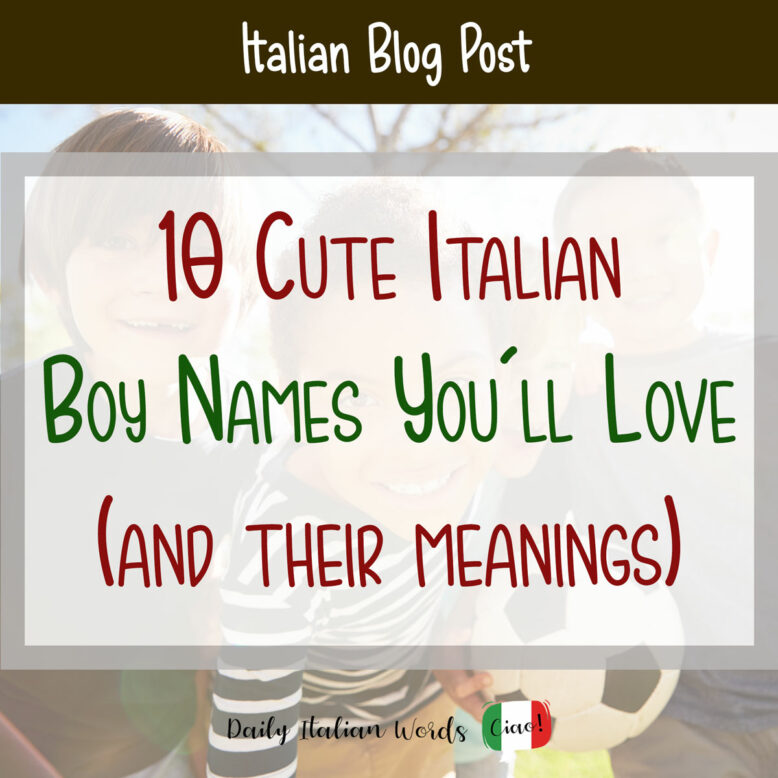During my time in Italy, I worked for five years at a nursery school, which meant I interacted with a lot of children! Most of the kids had very classic names, but there were a few with especially adorable names that stayed with me for years. Some of them even made it onto the shortlist when I was naming my son. (I ended up giving him a Welsh name, but that’s a whole other story!)
Here are ten of the cutest Italian baby boy names I encountered during my years in Italy. You may notice that nearly all of them have two things in common: they’re short and easy to pronounce!

Milo
Milo in Italian isn’t pronounced like the name English name Milo of the same spelling. The “i” sounds like the “ee” in “beep”.
The name Milo has diverse origins. In Slavic languages, its root mil- signifies “dear” or “beloved.” Another theory links it to the Latin word miles, signifying “soldier.” There’s also a connection to the ancient Greek milos, meaning “of the yew-flower.”
Tito
The name Tito derives from the Latin name Titus and means “saved.” It is found in both Italian and Spanish.

Zeno
Zeno comes from the ancient Greek name Zénon. which in turn comes from Zên, the accusative form of Zeus, meaning “of Zeus” or “related to Zeus”. In Italian, the name also exists as Zenone. Its popularity is due to various saints, especially Saint Zeno, patron of Verona and other cities. Over half the occurrences are in Veneto and Emilia-Romagna.
Luca
I’ve always loved the name Luca, so much so that it was amongst the top three names for our son.
The name is derived from the Latin name Lucas, a shortened form of Lucanus, or from the Greek name Loukas, an abbreviation of Loukanos. Both names share the meaning “from Lucania”. The Italian name Lucano also traces its roots to Lucanus and Loukanos, with Luca serving as a diminutive form of it.

Elia
Elia comes from the Hebrew name ‘Eliyyahu, combining El (“God”) and Yah (short for “Yahweh”), meaning “Yahweh is God” or “my God is Yahweh”. Note that Èlia, with the stress on the letter E, is the Italian feminine form of Elio, and is not related to Elia.
Elio
Elia and Elio sound so similar that I didn’t feel as if I could exclude either from the list!
The name Elio has a dual origin. It first derives from the Greek god of the Sun, Helios, through the Latin Helius, meaning “Sun.” Additionally, Elio may also stem from the Roman cognomen Aelius (feminine form Aelia), notably borne by Emperor Hadrian and widely used from the 2nd century onwards.

Nino
This name comes from abbreviations of names ending in -nino and -nina, like Antonino/a, Giannino/a, and so on. It also aligns with the Spanish terms niño (boy) and niña (girl). In Italy, it’s widely used nationwide. It also has a feminine form: Nina.
Enzo
Enzo’s origin is varied and not entirely certain. It may be an adaptation of the German name Heinz, a diminutive form of Heinrich (the Italian Enrico). Alternatively, it could derive from the Germanic name Anzo, rooted in the ancient term “ant” meaning “giant”.

Cosimo
This name derives from the Greek Kosmâs, likely linked to terms such as kosmos, kosméō, and kósmios. These encompass meanings like “universe order,” “world,” “ornament,” “discipline,” “decorum,” and more, and share the same origin as the English word cosmos. It’s possible the Greek name was originally a diminutive form of names starting with these roots.
Leone
Leone is a name of Greco-Latin origin, which literally means “lion”. Léon was a common name in Ancient Greece and Rome. What could be cuter than naming your son after the most noble creature on earth?

Heather Broster is a graduate with honours in linguistics from the University of Western Ontario. She is an aspiring polyglot, proficient in English and Italian, as well as Japanese, Welsh, and French to varying degrees of fluency. Originally from Toronto, Heather has resided in various countries, notably Italy for a period of six years. Her primary focus lies in the fields of language acquisition, education, and bilingual instruction.


